Were God's Festivals and Sabbaths Known and Observed Before They Were Written Down at Mt. Sinai?
Posted Mar 25, 2025 by Kevin J. Mullins in Questions Concerning Feast Days and Sabbaths
Updated: June 2, 2025
When it comes to the question of whether or not God’s Festivals and Sabbaths were observed before the time of Moses, there are three camps of thought.
- The majority of Christians who believe none of God’s yearly Festivals nor the weekly seventh-day Sabbath should be observed by “New Testament Christians” claim that these Festivals and Sabbaths were only given to the Jewish people at the time of Moses until the death of Christ.
- The minority of Christians who do believe that “New Testament Christians” should keep the Seventh-day Sabbath but not the other yearly Festivals claim that, although the seventh-day Sabbath was given and observed from the time of Creation, the yearly Festivals were only given to the Jews at the time of Moses until the death of Christ.
- Then there is an even smaller minority group who believe all of God’s Festivals and Sabbaths were given and observed from the time of Creation until the present day and beyond.
Everyone reading this article falls into one of these three groups. Let me state right from the start that I fall into group #3 and in this article I will attempt to show you why I do. Since everyone knows and believes these Festivals were observed from the time of Moses until the death of Christ, I will not be looking at Scriptures to prove this case. Likewise, I will also not be looking at Scriptures which show “New Testament Christians” observing these Festivals and Sabbaths since I have separate articles which do this. In this article, we will be focusing our attention from the time of Creation to the time of Moses, or more specifically, Mt. Sinai.
The Festivals and Sabbaths at the Time of Creation
To begin, let’s go back to the time of Creation and look at a portion of Scripture which everyone should be acquainted with:
“Thus the heavens and the earth were finished, and all the host of them. And on the seventh day God ended His work which He had made; and He rested on the seventh day from all His work which He had made. And God blessed the seventh day, and sanctified it: because that in it He had rested from all His work which God created and made.” (Genesis 2:1-3)
By comparing this Scripture with the Fourth Commandment, we see that this “seventh day” on which God “rested” was called “the Sabbath day.”
“Remember the Sabbath day, to keep it holy. Six days shalt thou labour, and do all thy work: But the seventh day is the Sabbath of the LORD thy God: in it thou shalt not do any work, thou, nor thy son, nor thy daughter, thy manservant, nor thy maidservant, nor thy cattle, nor thy stranger that is within thy gates: For in six days the LORD made heaven and earth, the sea, and all that in them is, and rested the seventh day: wherefore the LORD blessed the Sabbath day, and hallowed it.” (Exodus 20:8-11)
So far I’m sure there is no argument. The argument is whether or not human beings observed this seventh-day Sabbath from the time of Creation to the time God wrote the Fourth Commandment on stone tablets upon Mt. Sinai at the time of Moses. It clearly says God observed it by resting, but there is no direct mention of man doing this. Although this is apparently true (at least on the surface), there are ways that we can conclude that it was observed (or at least implied).


In Mark 2:27, Jesus is quoted as saying, “The Sabbath was made for man, and not man for the Sabbath.” Since the Sabbath was “sanctified” (set-apart for holy use) and made for the benefit of man at the end of the Creation week, wouldn’t it be odd that it would not be a holy day for man’s benefit until 2,500 years later when God reminded them of the Sabbath?
Also, the Greek word Mark uses for the word “man” is ἄνθρωπος (anthrópos). The Hebrew equivalent of this word is אָדָם, which is pronounced adam.
“H120 אָדָם (adam) – Refers to man or mankind, often used in the Old Testament to denote humanity or the first man, Adam.” (Strong’s Lexicon)
Now this doesn’t mean the word specifically refers to the male only in the Creation story, of whom we refer to by the proper name Adam. It refers to the whole of mankind, including both genders (male and female).
“This is the book of the generations of Adam. In the day that God created man, in the likeness of God made He him; Male and female created He them; and blessed them, and called THEIR name Adam, in the day when they were created.” (Genesis 5:1-2)
Although a non-Sabbath keeper, American evangelist and publisher, D.L. Moody (1837-1899), wrote:
“The Sabbath was binding in Eden, and it has been in force ever since. The fourth commandment begins with the word ‘remember,’ showing that the Sabbath already existed when God wrote the law on tables of stone at Sinai.” (D.L. Moody, Weighed and Wanting, p. 47)
With that said, is there any evidence for the other Festivals at the time of Creation? Although Group #2 mentioned above believes and teaches that the seventh-day Sabbath was instituted at the time of Creation before sin entered, they do not believe the other Festivals were. Instead, they say these Festivals were not instituted (or, added) until the time of Moses, long after sin entered. However, let me show you a Scripture verse which refers to the Festivals when God created the fourth day of the week:
“And God said, Let there be lights in the firmament of the heaven to divide the day from the night; and let them be for signs, and for seasons, and for days, and years.” (Genesis 1:14)
Do you see it? It’s actually the word translated as “seasons.” This does not simply refer to seasons as we know it: Winter, Spring, Summer, and Fall. The Hebrew word Moses uses when writing this is מוֹעֵד (moéd or moédim for plural), which means “appointed times.” Strong's Lexicon defines it as “properly an appointment, that is, a fixed time or season; specifically a festival.” It is the exact same word Moses uses when outlining God’s Festivals in Leviticus 23.
“And the LORD spake unto Moses, saying, Speak unto the children of Israel, and say unto them, Concerning the feasts [moédim] of the LORD, which ye shall proclaim to be holy convocations, even these are My feasts [moédim] … These are the feasts [moédim] of the LORD, even holy convocations, which ye shall proclaim in their seasons [moédim – appointed times].” (Leviticus 23:1-2, 4)
In the Holman Christian Standard Bible, Genesis 1:14 is translated like this: “They will serve as signs for festivals and for days and years.” In the footnote it says, “Or for the appointed times.” Here are a few more translations:
God’s Word Translation: “Then God said, 'Let there be lights in the sky to separate the day from the night. They will be signs and will mark religious festivals, days, and years.'"
Good News Translation: “Then God commanded, ‘Let lights appear in the sky to separate day from night and to show the time when days, years, and religious festivals begin.’”
Literal Standard Version: “And God says, ‘Let luminaries be in the expanse of the heavens, to make a separation between the day and the night, then they have been for signs, and for appointed times [moédim], and for days and years.’”
Commenting on the word moédim in Genesis 1:14, Adam Clarke writes:
“[Seasons, Moédim] - For the determination of the times on which the sacred festivals should be held. In this sense the word frequently occurs; and it was right that at the very opening of his revelation God should inform man that there were certain festivals which should be annually celebrated to his glory.” (Adam Clarke's Commentary on the Whole Bible, Genesis 1:14)
And here is John Gill:
“The Targum of Jonathan [Aramaic translation] is, ‘and let them be for signs and the times of the feasts, and to reckon with them the number of days, and, sanctify the beginnings of the months, and the beginnings of the years, and the intercalations of months and years, the revolutions of the sun, and the new moons, and cycles.’ And so Jarchi [medieval French Rabbi, a.k.a. Rashi] interprets ‘seasons’ of the solemn festivals, that would hereafter be commanded the children of Israel; but those uses were not for a certain people, and for a certain time, but for all mankind, as long as the world should stand.” (John Gill's Exposition of the Bible, Genesis 1:14)
When writing of the Creation account, Moses is quoting God who said these lights in the sky “will mark religious festivals, days, and years.” God is establishing this fact on the fourth day of Creation. Like we pointed out concerning the Sabbath, it just doesn’t make sense that God was looking forward 2,500 years or so. He did not say, “Let these lights in the sky be to mark off days, years, and Festivals …. but not until 2,500 years from now.”
So yes, even the annual Festivals were known and kept before sin entered this world and well before a “Jew” ever existed. Although we are not completely sure how long it took man to sin, surely these Festivals would have been observed differently before sin than they were after. The incorporation of animal sacrifices after sin being one main difference.
“To sum up, out of 224 occurrences of [moéd] in the Hebrew Bible, 197 are singular and twenty-seven are plural (including Gn. 1:14). [This] indicates that of the twenty-six plural forms subsequent to the creation account, twenty-two mean ‘festivals’. This demonstrates that the plural form of [moéd] eighty-five percent of the time means ‘festivals’ in the Hebrew Bible. The figure rises to one hundred percent in the Torah [first five book of the Bible], the literary background of Genesis 1:14. Moreover, when all of the exact lexical forms of [moéd] in Genesis 1:14 are … evaluated, the ‘festivals’ rendering occurs one hundred percent of the time.” (David J. Rudolph, Festivals in Genesis 1:14, p. 31, words in brackets added)
The Festivals and Sabbaths at the Time of Cain and Abel
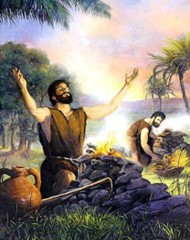 “And in process of time it came to pass, that Cain brought of the fruit of the ground an offering unto the LORD. And Abel, he also brought of the firstlings of his flock and of the fat thereof. And the LORD had respect unto Abel and to his offering: But unto Cain and to his offering he had not respect. And Cain was very wroth, and his countenance fell.” (Genesis 4:3-5)
“And in process of time it came to pass, that Cain brought of the fruit of the ground an offering unto the LORD. And Abel, he also brought of the firstlings of his flock and of the fat thereof. And the LORD had respect unto Abel and to his offering: But unto Cain and to his offering he had not respect. And Cain was very wroth, and his countenance fell.” (Genesis 4:3-5)
The phrase we will focus on here is “And in the process of time.” Literally, this phrase is, “And it comes to pass at the end of days” (Literal Standard Version). It’s not speaking of any random or indefinite amount of time, as is incorrectly translated by some Bibles. Some examples of this would be God’s Word Translation, which simply says, “Later Cain brought some crops from the land as an offering to the LORD.” Or the Good News Translation: “After some time …” No, it is speaking of a specific time of the year. The New English Translation says, “At the designated time.” Or more precisely, “When it was time for the harvest” (New Living Translation). This “time of harvest” later became known as Sukkot, or the Feast of Booths/Tabernacles, which is a harvest festival that celebrates the end-of-year harvest celebrated on the fifteenth day of the seventh month of the Jewish calendar, which is usually in late September or October on the Gregorian calendar (Leviticus 23:33-43).
Although most commentators agree this is speaking of a specific time, they are unsure if this means at the end of the year (the time of harvest) or even the end of the week (the Sabbath). Here is what John Wesley wrote:
“In process of time - At the end of days, either at the end of the year when they kept their feast of in-gathering, or at the end of the days of the week, the seventh day; at some set time Cain and Abel brought to Adam, as the priest of the family, each of them an offering to the Lord; for which we have reason to think there was a divine appointment given to Adam, as a token of God's favour notwithstanding their apostacy.” (Wesley’s Notes on the Bible, Genesis 4:3)
Believing this is referring specifically to “the time of harvest”, John Gill wrote:
“ … according to Aben Ezra, it was at the end of the year; So ‘after days’ in Judges 11:4 is meant after a year; and which we there render, as here, ‘in process of time’. This might be after harvest, after the fruits of the earth were gathered in, and so a proper season to bring an offering to the Lord, in gratitude for the plenty of good things they had been favoured with; as in later times, with the Israelites, there was a feast for the ingathering of the fruits of the earth, Exodus 23:16.” (Gill's Exposition, Genesis 4:3)
However, believing this is referring specifically to the seventh-day Sabbath, the Jamieson-Fausset-Brown Bible Commentary states, “In process of time—Hebrew, ‘at the end of days,’ probably on the Sabbath.” Agreeing with this, Adam Clarke wrote:
“In process of time - מקץ ימים mikkets yamim, at the end of days. Some think the anniversary of the creation to be here intended; it is more probable that it means the Sabbath, on which Adam and his family undoubtedly offered oblations to God, as the Divine worship was certainly instituted, and no doubt the Sabbath properly observed in that family. This worship was, in its original institution, very simple.” (Clarke’s Commentary on the Bible, Genesis 4:3)
Although I lean towards “the time of harvest”, whether it was the Sabbath or a set time at the end of the year (harvest/ingathering) is not the point in our study. The point is that Scripture refers to a specific appointed time that Adam and his family observed that is directly linked to God’s Festivals and Sabbaths.
The Festivals and Sabbaths at the Time of Enoch
 The prophet Enoch lived during the seventh generation from Adam (Jude 1:14). Of Enoch we read, “By faith Enoch was translated that he should not see death; and was not found, because God had translated him: for before his translation he had this testimony, that he pleased God” (Hebrews 11:5). A nice parallel verse to this would be 1 John 3:22 which says:
The prophet Enoch lived during the seventh generation from Adam (Jude 1:14). Of Enoch we read, “By faith Enoch was translated that he should not see death; and was not found, because God had translated him: for before his translation he had this testimony, that he pleased God” (Hebrews 11:5). A nice parallel verse to this would be 1 John 3:22 which says:
“And whatsoever we ask, we receive of Him, because we keep His Commandments, and do those things that are pleasing in His sight.”
Therefore, to “please God” is to obey (listen and submit to) “His Commandments.” Jesus said, “And He that sent Me is with Me: the Father hath not left Me alone; for I do always those things that please Him” (John 8:29). And then later He said, “If ye keep My Commandments, ye shall abide in My love; even as I have kept My Father's Commandments, and abide in His love” (John 15:10).
The book of Genesis tells us, “And Enoch walked with God: and he was not; for God took him [translated him without seeing death]” (Genesis 5:24). What does it mean that “Enoch walked with God?
“Hearken now unto My voice, I will give thee counsel, and God shall be with thee: Be thou for the people to God-ward, that thou mayest bring the causes unto God: And thou shalt teach them Ordinances and Laws, and shalt show them the way wherein they must walk, and the work that they must do.” (Exodus 18:19-20)
“Ye shall do My Judgments, and keep Mine Ordinances, to walk therein: I am the LORD your God. Ye shall therefore keep My Statutes, and My Judgments: which if a man do, he shall live in them: I am the LORD.” (Leviticus 18:4-5)
“Ye shall keep My Sabbaths, and reverence My sanctuary: I am the LORD. If ye walk in My Statutes, and keep My commandments, and do them; Then I will give you rain in due season, and the land shall yield her increase, and the trees of the field shall yield their fruit.” (Leviticus 26:2-4)
“And now, Israel, what doth the LORD thy God require of thee, but to fear the LORD thy God, to walk in all His ways, and to love Him, and to serve the LORD thy God with all thy heart and with all thy soul, To keep the Commandments of the LORD, and His Statutes, which I command thee this day for thy good.” (Deuteronomy 10:12-13)
“Ye shall walk after the LORD your God, and fear Him, and keep His Commandments, and obey His voice, and ye shall serve Him, and cleave unto him.” (Deuteronomy 13:4)
“Blessed are they that keep His Testimonies, and that seek Him with the whole heart. They also do no iniquity: they walk in His ways. Thou hast commanded us to keep thy Precepts diligently. that my ways were directed to keep Thy Statutes! Then shall I not be ashamed, when I have respect unto all Thy Commandments. I will praise thee with uprightness of heart, when I shall have learned Thy righteous Judgments. I will keep Thy Statutes: O forsake me not utterly.” (Psalm 119:2-8)
So, to “walk with God” means to obey His voice by keeping all of His Laws, Commandments, Statutes and Judgments. Among other things, the word “statute” חֻקָּה (chuqqah) is directly related to God’s Festivals.
Feast of Passover/Unleavened Bread: “This day shall be for you a memorial day, and you shall keep it as a feast to the LORD; throughout your generations, as a Statute [chuqqah] forever, you shall keep it as a feast.” (English Standard Version)
Feast of Firstfruits: “it shall be a Statute [chuqqah] forever throughout your generations in all your dwellings.” (Verse 14)
Feast of Pentecost: “it shall be a Statute [chuqqah] forever in all your dwellings throughout your generations.” (Verse 21)
Day of Atonement: “it shall be a Statute [chuqqah] forever throughout your generations in all your dwellings.” (Verse 31)
Feast of Tabernacles: “it shall be a Statute [chuqqah] forever in your generations: ye shall celebrate it in the seventh month.” (Verse 41)
Although Scripture does not directly say Enoch observed Sabbaths and Festivals, we can conclude that he did by simple implication.
The Festivals and Sabbaths at the Time of Abraham
Again, although not specifically mentioned, we do have reason to believe that Abraham kept God’s Festivals and Sabbaths. Please follow this logic carefully.
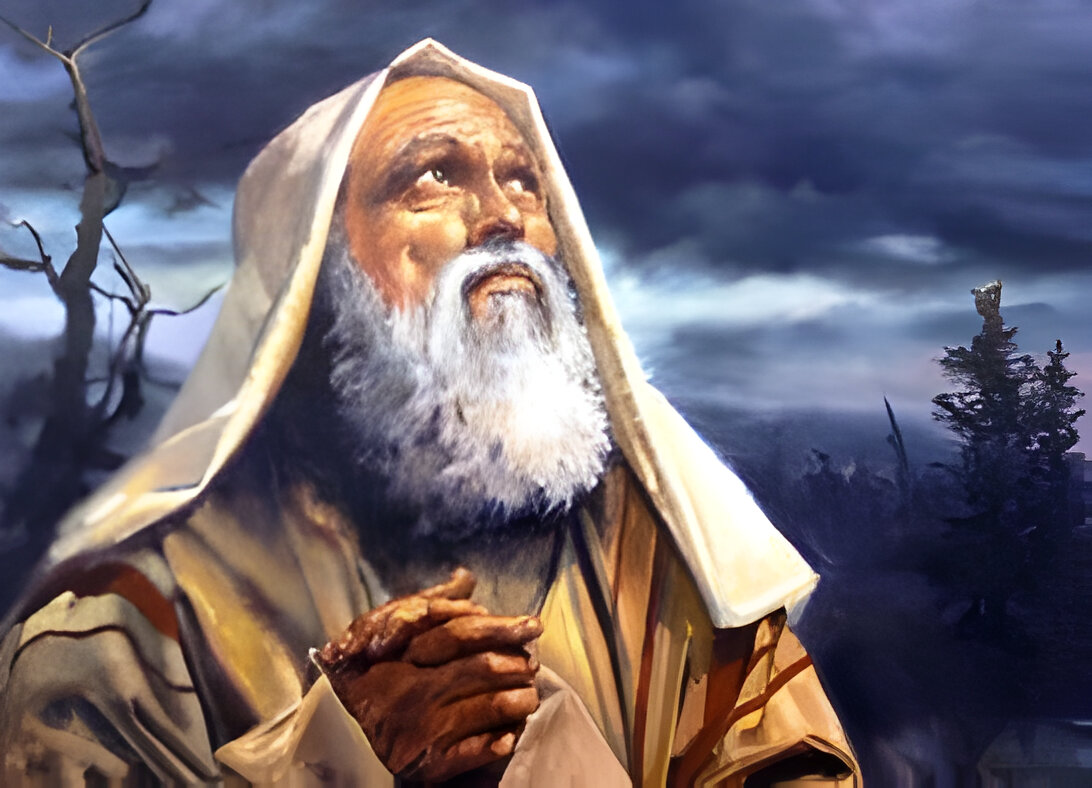 In Genesis 26:5 God says this concerning Abraham:
In Genesis 26:5 God says this concerning Abraham:
“… Abraham obeyed My voice, and kept My charge, My Commandments, My Statutes, and My Laws.”
Keep in mind this is before God spoke and gave the Law in written form during the time of Moses. According to Scripture, Abraham kept God’s Commandments, Statutes, and Laws. As we see, the word “Statutes” (chuqqah) is mentioned which does imply Sabbaths and Festivals. But can we prove to some extent that Abraham did keep these? I believe we can.
The wording is important here. God calls them “My Commandments, My Statutes, and My Laws.” God says something similar to the Israelites who were journeying from Egypt to Mt. Sinai.
“And the LORD said unto Moses, How long refuse ye to keep My Commandments and My Laws?” (Exodus 16:28)
Abraham was commended for keeping God’s Commandments and Laws, while Israel was rebuked for not keeping God’s Commandments and Laws. What did Israel do to receive this rebuke? The people had begun to complain about lack of food to the point that they distrusted God, thinking He had led them out into the wilderness to kill them (Verse 1-3). God responded to this accusation by saying:
“… Behold, I will rain bread from heaven for you; and the people shall go out and gather a certain rate every day, that I may prove them, whether they will walk in My law, or no.” (Verse 4)
Even while they murmured, out of His everlasting love for them, God would rain bread down from heaven for them. In doing this, He would also prove if they had repented from their distrust. The proof would be whether or not they would walk in His Law or not. Would they walk in His Law as Abraham did or choose to continue in disobedience? The interesting point here for us is the fact that this opportunity to show their trust or distrust revolved around the observance of the seventh-day Sabbath.
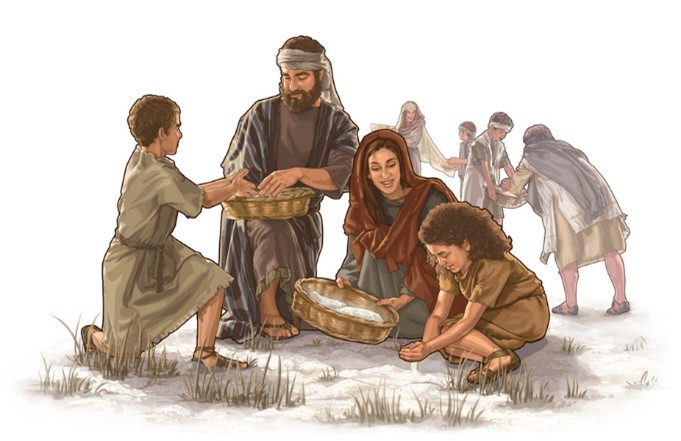 The instruction for them was that each day they were to gather as much bread needed for that day because it would spoil by the next day. They were to do this for the first five days of each week. However, on the sixth day they were to gather twice as much because they were not to gather any upon the seventh day (the Sabbath). God instructed: “Six days ye shall gather it; but on the seventh day, which is the Sabbath, in it there shall be none” (Verse 26). In doing this, God would preserve the added amount of bread for them to eat on the Sabbath.
The instruction for them was that each day they were to gather as much bread needed for that day because it would spoil by the next day. They were to do this for the first five days of each week. However, on the sixth day they were to gather twice as much because they were not to gather any upon the seventh day (the Sabbath). God instructed: “Six days ye shall gather it; but on the seventh day, which is the Sabbath, in it there shall be none” (Verse 26). In doing this, God would preserve the added amount of bread for them to eat on the Sabbath.
However, “it came to pass, that there went out some of the people on the seventh day for to gather, and they found none” (Verse 27). This is when God says, “How long refuse ye to keep My Commandments and My Laws?” (Verse 28), and then adds, “See, for that the LORD hath given you the Sabbath, therefore He giveth you on the sixth day the bread of two days; abide ye every man in his place, let no man go out of his place on the seventh day. So the people rested on the seventh day” (Verses 29-30).
Some believe God is instructing His people not to leave their homes upon the Sabbath, but this is not accurate. He is simply instructing them not to go out into the fields to gather any bread because there wouldn’t be any.
The point here is that, since the Israelites were rebuked for not keeping God’s Commandments and Laws by not observing the seventh-day Sabbath, then Abraham, who was commended for keeping God’s Commandments and Laws, must have been observing the seventh-day Sabbath.
Some believe that the Commandments and Laws mentioned in Exodus 16 are different than the Commandments and Laws during the time of Abraham. However, the phrase, “How long refuse ye to keep My Commandments and My Laws?” suggests that these same Commandments and Laws (including the Sabbath) had already long been established. There really is no reason to believe these Commandments and Laws were any different.
Another point we can make here is simply the fact that this incident with the manna is also before God had spoken and given His Commandments and Laws in written form upon Mt. Sinai. Only “some” of the people chose not to observe the seventh-day Sabbath. After the loving rebuke, Scripture says, “So the people rested on the seventh day” which implies everyone.
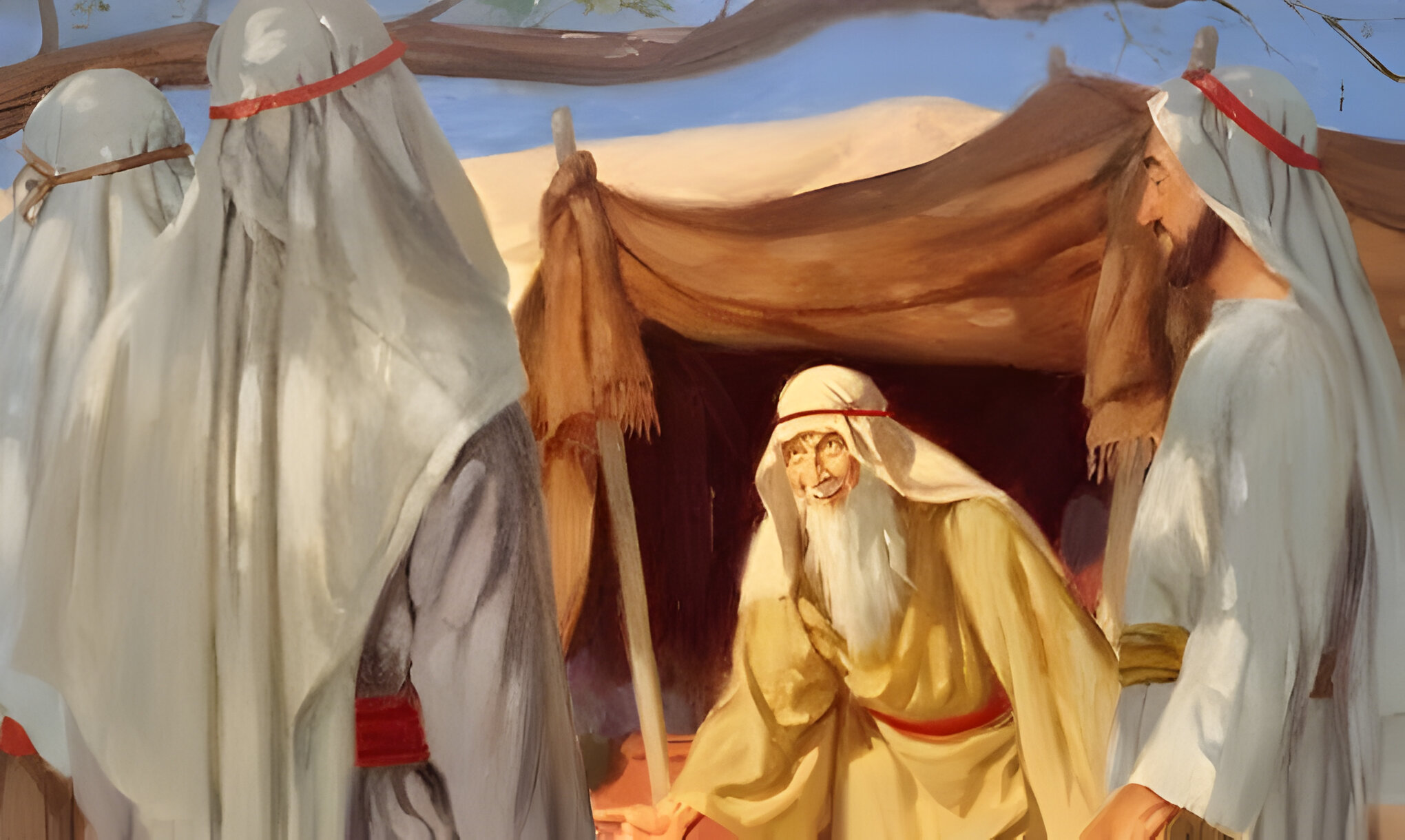 With that said, is there any evidence that the yearly Festivals were known to some degree during the time of Abraham? Yes. In Genesis 18, we read of the account of the three angels (heavenly messengers) who visited Abraham. In verse 10, one of these messengers (whom I believe to be Jesus), says:
With that said, is there any evidence that the yearly Festivals were known to some degree during the time of Abraham? Yes. In Genesis 18, we read of the account of the three angels (heavenly messengers) who visited Abraham. In verse 10, one of these messengers (whom I believe to be Jesus), says:
“… I will certainly return unto thee according to the time of life; and, lo, Sarah thy wife shall have a son. And Sarah heard it in the tent door, which was behind him.” (Verse 10)
Our focus here will be the phrase “the time of life.” Other translations say, “This time next year.” In Hebrew this phrase is ka’et chayyah, which can be translated “in the spring.” John Gill writes: “… this would be about the same time in the next year, perhaps at the spring of the year, which may be called “a time of life”, when all things revive, which in the winter season seem to be dead” (Gill’s Exposition, Genesis 18:10). This would indicate that the angels visited Abraham in the spring and then promised that Isaac would be born the following spring.
Connected with this, we can skip down to verse 14, where the messenger says, “At the time appointed I will return unto thee, according to the time of life [Spring].” The word for “appointed time” is the Hebrew word mo'ed which we have seen is connected to the Festivals. What Festival was in the Spring? Passover! In his book, Genesis: A New English Translation Mikraot Gedolot, Rabbi A. J. Rosenberg, quotes the famous French Rabbi, Shlomo Yitzchaki (also known as Rashi) as saying, “At this time, next year. It was Passover, and on the following Passover, Isaac was born.” In the Jewish Talmud, we read, “On Passover Isaac was born. How do we know that Isaac was born on Passover?—Because it is written, ‘On the [next] festival (mo'ed) I will return unto thee’” (b.Rosh HaShanah 10a-11a).
We also have a clue that the heavenly messengers were visiting Abraham around the time of Passover when we skip ahead to Genesis 19 where we see Lot (Abraham’s nephew) feeds two of these same messengers a feast of matzah (unleavened bread) just before the destruction of Sodom and Gomorrah:
“And he [Lot] pressed upon them greatly; and they turned in unto him, and entered into his house; and he made them a feast, and did bake unleavened bread, and they did eat.” (Genesis 19:3)
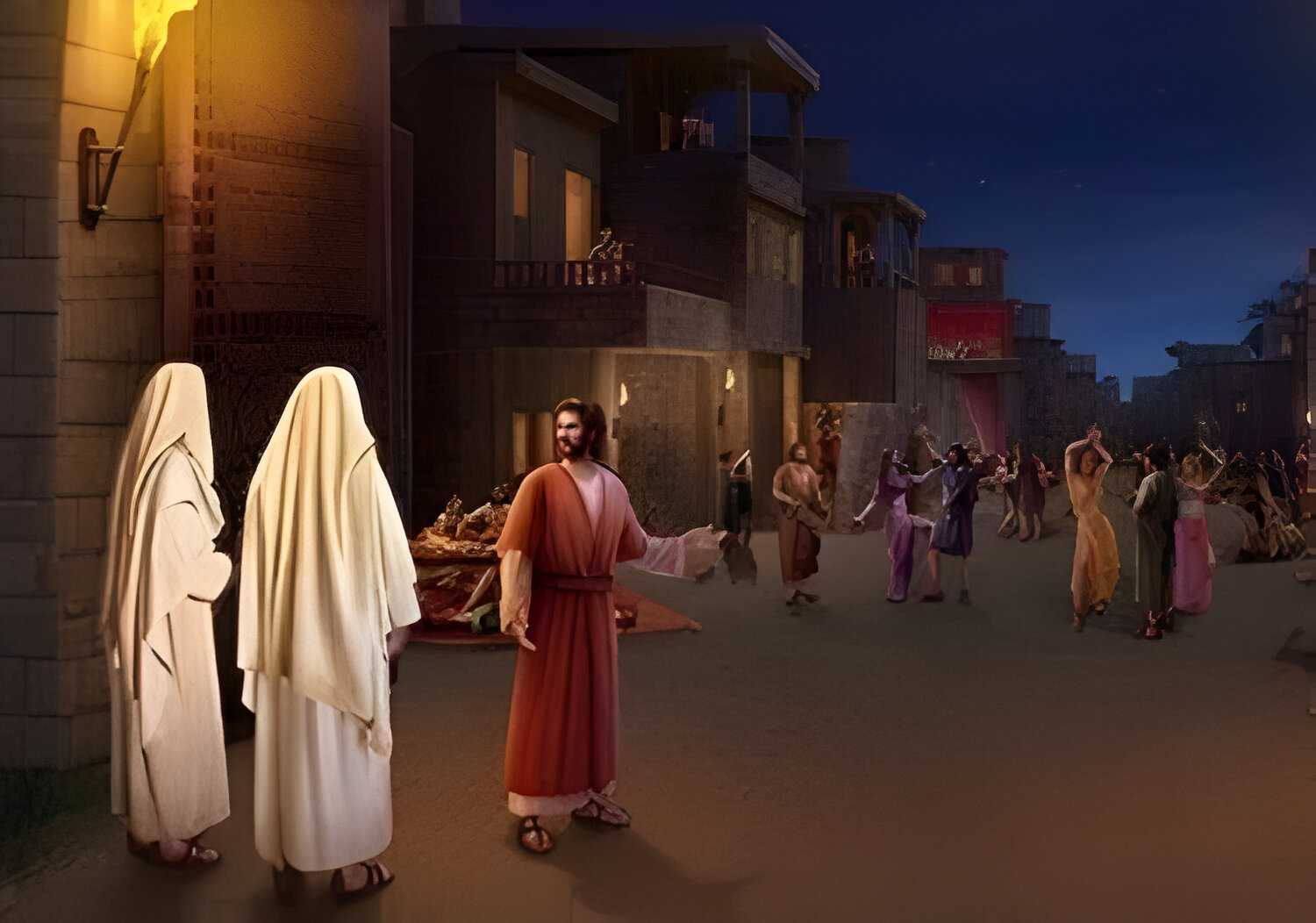 According to Jewish tradition, the instruction to eat unleavened bread was given “in honor of Sarah [Abraham’s wife] who prepared cakes for the angels [Genesis 18:6] …” (Exodus Rabbah 14:2). However, when we look even further back, we read of the meeting between Abraham and Melchizedek:
According to Jewish tradition, the instruction to eat unleavened bread was given “in honor of Sarah [Abraham’s wife] who prepared cakes for the angels [Genesis 18:6] …” (Exodus Rabbah 14:2). However, when we look even further back, we read of the meeting between Abraham and Melchizedek:
“And Melchizedek king of Salem brought forth bread and wine: and he was the priest of the most high God. And he blessed him, and said, Blessed be Abram [Abraham] of the most high God, possessor of heaven and earth.” (Genesis 14:18-19)
We know from Scripture, that as soon as sin entered, Jesus was ordained as our High Priest forever “after the order of Melchizedek” (Psalm 110:4; Hebrews 7:17). It is no wonder then, that when Jesus observed His last Passover meal with His disciples, He ordained the use of bread and wine (Luke 22:14-20). Just as there was no animal sacrifice when Melchizedek presented Abraham with bread and wine and blessed him, the Passover we are to celebrate today is free from animal sacrifice as we instead partake of Jesus (John 6:54), “the Lamb slain from the foundation of the world” (Revelation 13:8).
“Your glorying is not good. Know ye not that a little leaven leaveneth the whole lump? Purge out therefore the old leaven, that ye may be a new lump, as ye are unleavened. For even Christ our Passover is sacrificed for us: Therefore let us keep the feast, not with old leaven, neither with the leaven of malice and wickedness; but with the unleavened bread of sincerity and truth.” (1 Corinthians 5:6-8)
Coming back to Abraham, there is even a liturgical hymn that alludes to the idea that the visitation of the angels and the birth of Isaac happened during Passover that is sung at the conclusion of the second Passover Seder:
To the Oriental (Abraham) You revealed the future midnight of Passover.
At his door You knocked in the heat of the day on Passover.
He satiated the angels with matza-cakes on Passover.
And he ran to the herd—symbolic of the sacrificial beast of Passover.
The Sodomites provoked (God) and were destroyed by fire on Passover.
Lot was withdrawn from them, he had baked matzot at the time of Passover.
(Translation from Rabbi Avie Gold, The Complete Artscroll Machzor Pesach:
Sefard, Brooklyn, NY: Mesorah: 2001, 145)
In conclusion of this section concerning Passover at the time of Abraham, I’d like to give credit to Toby Janicki, from First Fruits of Zion. In his article from where I received much of this information he concludes:
“From my perspective, it seems that if there was a Passover-like celebration that was observed before the instructions given at the Exodus from Egypt, it was akin to Chag HaMatzot, the week-long Festival of Unleavened Bread, and that the institution of Pesach (the actual Passover sacrifice) was added in Egypt … Although the festivals were later committed and entrusted to the Jewish nation, they contain universal truths and applications for all mankind to celebrate. Therefore, [the account of the visitation of the angels with Abraham] may well indeed give evidence of individuals celebrating Chag HaMatzot before it became directly associated with the Exodus from Egypt.” (Abraham’s Passover, ffoz.org, words in brackets added)
The Festivals and Sabbaths at the Time of Joseph
“Blow up the trumpet in the New Moon, in the time appointed, on our solemn Feast day. For this was a statute for Israel, and a Law of the God of Jacob. This He ordained in Joseph for a testimony, when he went out through the land of Egypt: where I heard a language that I understood not.” (Psalm 81:3-5)
 Here in the book of Psalms we read that God had also ordained His Festivals in the time of Joseph. They were to blow the trumpet (the shofar) on the New Moon, in the time appointed, and other solemn Feast days. There is however some differences of opinions on the phrase “when he went through the land of Egypt.” Is the “he” Joseph or God? Some translations reveal it is God, and interpret the phrase “went out through” as “exited” at the time God led His people from Egypt. This interpretation is seen in the New International Version: “When God went out against Egypt, he established it as a statute for Joseph …” with “Joseph” here being referred to as another name for “Israel.”
Here in the book of Psalms we read that God had also ordained His Festivals in the time of Joseph. They were to blow the trumpet (the shofar) on the New Moon, in the time appointed, and other solemn Feast days. There is however some differences of opinions on the phrase “when he went through the land of Egypt.” Is the “he” Joseph or God? Some translations reveal it is God, and interpret the phrase “went out through” as “exited” at the time God led His people from Egypt. This interpretation is seen in the New International Version: “When God went out against Egypt, he established it as a statute for Joseph …” with “Joseph” here being referred to as another name for “Israel.”
However, instead of “God went out against” I believe this is linked more to what we read in Genesis 41:45 where, instead of “exiting”, the same Hebrew words are used in connection with Joseph going out over (or, went throughout) all the land of Egypt:
“And Pharaoh called Joseph's name Zaphnathpaaneah; and he gave him to wife Asenath the daughter of Potipherah priest of On. And Joseph went out over all the land of Egypt. And Joseph was thirty years old when he stood before Pharaoh king of Egypt. And Joseph went out from the presence of Pharaoh, and went throughout all the land of Egypt.” (Genesis 41:45-46)
In Ellicott's Commentary for English Readers, we read:
“Joseph too, would rightly regard the whole matter as providential, and though he might not know for what exact purpose, as regards his race, he was thus exalted, there was noble work for him to do in saving Egypt from perishing by famine. The narrative throughout represents him as remaining true to the religion of his family (Genesis 41:51-52; Genesis 42:18; Genesis 43:29; Genesis 45:5; Genesis 45:7-9; Genesis 48:9) … Pharaoh himself, in Genesis 41:38-39, speaks as one that acknowledged a supreme God, and Joseph throughout freely used to him the name of Elohim.” (On Genesis 41:45)
Although it was becoming more difficult, Joseph remained true to the religion of his family. The book of Numbers writes what was practiced at the time of the patriarchs:
“Also at your times of rejoicing—your appointed festivals and New Moon feasts—you are to sound the trumpets [shofars] over your burnt offerings and fellowship offerings, and they will be a memorial for you before your God. I am the LORD your God.” (Numbers 10:10, New International Version)
As the Psalmist said, these things God ordained in Joseph “for a testimony” among the Egyptians. As Joseph entered into his new office, recollecting the grain throughout the land, he (through his work ethic and practice) made known to all Egyptians the New Moon as a divinely-appointed day of feast, for he would rest, worship and do no work, resulting in the seven good years of plenty. It’s no coincidence that God's holy day calendar is tied to the agricultural cycles as well as agricultural prophetic themes.
As time progressed and the people grew, they assimilated into the Egyptian culture and these solemn Feasts were lost sight of until God sent Moses to deliver His people from bondage and begin a work of reform.
The Festivals and Sabbaths at the Time of the Exodus
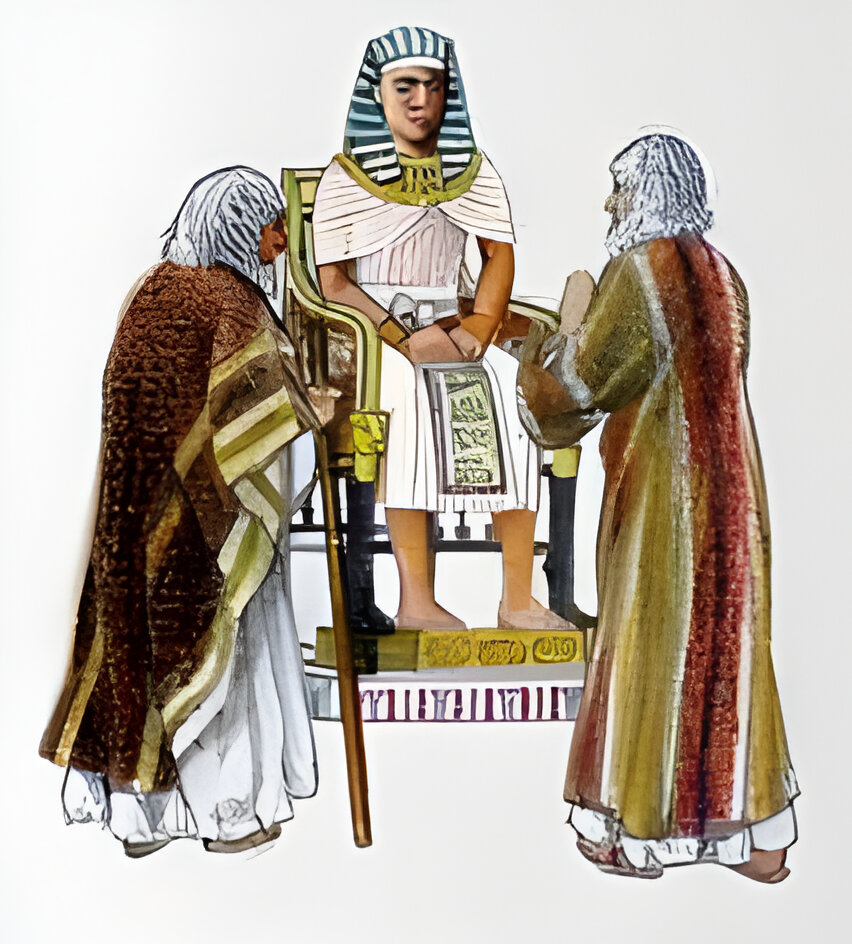 “And afterward Moses and Aaron went in, and told Pharaoh, Thus saith the LORD God of Israel, Let My people go, that they may hold a feast unto Me in the wilderness.” (Genesis 5:1)
“And afterward Moses and Aaron went in, and told Pharaoh, Thus saith the LORD God of Israel, Let My people go, that they may hold a feast unto Me in the wilderness.” (Genesis 5:1)
The Hebrew word for feast here is חָגַג (chagag), which Strong’s Lexicon defines as “To celebrate, to hold a feast, to make a pilgrimage.” We do not know over what time frame the plagues took place. The seventh plague of the hail took place around the time of the new year because the barley was in its first fruit state (Exodus 9:31). It took considerable time from the first request to observe a feast in Exodus 5:1 till all the plagues were completed at the time of Passover. As we will see in a bit, all the events related to making bricks without straw and trials of the Israelites and then the plagues suggest it is probable that this pilgrim feast was a prototype of either the feast of Pentecost or of Tabernacles in which they were seeking to observe.
Pharoah’s response to Moses’ request was as follows:
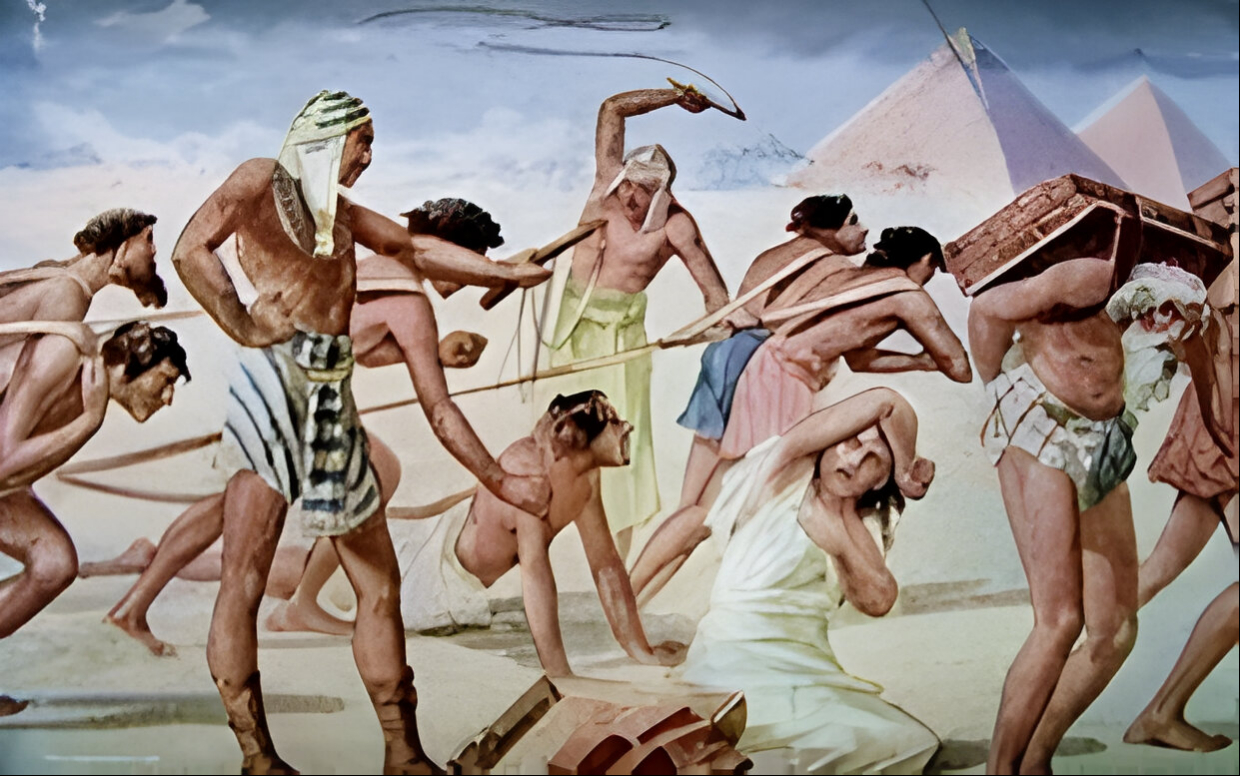 “And the king of Egypt said unto them, Wherefore do ye, Moses and Aaron, let the people from their works? get you unto your burdens. And Pharaoh said, Behold, the people of the land now are many, and ye make them rest from their burdens. And Pharaoh commanded the same day the taskmasters of the people, and their officers, saying, Ye shall no more give the people straw to make brick, as heretofore: let them go and gather straw for themselves. And the tale of the bricks, which they did make heretofore, ye shall lay upon them; ye shall not diminish ought thereof: for they be idle; therefore they cry, saying, Let us go and sacrifice to our God. Let there more work be laid upon the men, that they may labour therein; and let them not regard vain words.” (Exodus 5:4-9)
“And the king of Egypt said unto them, Wherefore do ye, Moses and Aaron, let the people from their works? get you unto your burdens. And Pharaoh said, Behold, the people of the land now are many, and ye make them rest from their burdens. And Pharaoh commanded the same day the taskmasters of the people, and their officers, saying, Ye shall no more give the people straw to make brick, as heretofore: let them go and gather straw for themselves. And the tale of the bricks, which they did make heretofore, ye shall lay upon them; ye shall not diminish ought thereof: for they be idle; therefore they cry, saying, Let us go and sacrifice to our God. Let there more work be laid upon the men, that they may labour therein; and let them not regard vain words.” (Exodus 5:4-9)
Here, the word “rest” is שָׁבַת (shabath), which Strong’s Lexicon defines as:
“The Hebrew verb ‘shabath’ primarily means to cease or desist from work, to rest. It is most commonly associated with the Sabbath, a day of rest instituted by God. The term implies a cessation of activity, often for the purpose of rest or reflection. In the biblical context, it is used to describe God's rest after creation and the commanded rest for the Israelites on the seventh day.”
Although this word can be associated with the seventh-day Sabbath Festival, it is not referring to the actual Sabbath day. It simply refers to “cease or desist from work” in general. The Young’s Literal Translation says, “ye have caused them to cease from their burdens!” Arguing against the claim that this refers to the seventh-day Sabbath, Peter Geoman, writes:
“Another passage sometimes brought out as evidence for a pre-Decalogue Sabbath is Moses’ interaction with Pharaoh in Exodus 5. In Exodus 5:1 Moses asks Pharaoh to permit the people to go into the wilderness to celebrate a feast. In Exodus 5:5 Pharaoh refuses to let the people go and accuses Moses of wanting to make Israel “rest” (ESV) from their labors, using the verbal form of Sabbath (שׁבת). Although some see the use of this verb as evidence for the ancients recognizing the binding nature of the Sabbath, the evidence does not support that conclusion. When this verb is used in the Hiphil stem (40 times) it never refers to the Sabbath (or rest in general), but a cessation or stopping of an activity. For example, it is used of removing leaven from a house (Exod 12:15), putting an end to shouting (Isa 16:10), and putting an end to a proverb (Ezek 12:23), or of stopping sheep from eating (Ezek 34:10). Clearly Exodus 5:5 cannot be used as evidence for a pre-Decalogue Sabbath.” (When Did God Establish the Sabbath Command? petergeoman.com, Feb. 5, 2022)
However, as already mentioned, although this may not be referring to the specific seventh-day Sabbath, it is definitely rooted in the Sabbath. When mentioning this “rest”, Moses could have used four other Hebrew words for rest—manowach (Genesis 8:9); sha`an (Genesis 18:4); shamat (Exodus 23:11); nuwach (Exodus 23:12) —but he specifically chooses the only one that is rooted in the word used for the seventh-day Sabbath.
- Exodus 5:1: Rest, Strong’s number 7673, שָׁבַת (shabath)
- Exodus 20:8: Sabbath, Strong’s number 7676, שַׁבָּת (shabbath)
In fact, looking closer at Exodus 23:12, Moses uses two different words for “rest”— “Six days thou shalt do thy work, and on the seventh day thou shalt rest [shabath]: that thine ox and thine ass may rest [nuwach], and the son of thy handmaid, and the stranger, may be refreshed.” So here again we see a connection to the Sabbath. What I see in this evidence is God, through Moses, instituting the beginning steps of a Sabbath reform among His people. The Lord also wanted to save Egypt from destruction. If Pharaoh would give his permission for Israel to keep a Feast then he would be responsible for the action they took and would therefore benefit from the feast the Israelites engaged in. This is why God did not simply tell Pharaoh we are leaving. God did not want to leave the Egyptians to the mercy of Satan. He wanted to save them! The Sabbath reform, first in the weekly Sabbath, followed up by an annual Sabbath was the method the Lord chose to bring about this reform and rebuild a hedge of protection for them. Through these Statutes God could continue to protect the Israelites. They had been in Egypt for 430 years and had lost sight of God’s Commandments, Statutes, and Laws through their assimilation into the Egyptian culture.
Even though God had physically led them out of the land of Egypt, He compassionately and patiently suffered long in spiritually getting rid of Egypt out of His people. Along their journey to Mt Sinai, the people often complained and desired to go back to Egypt:
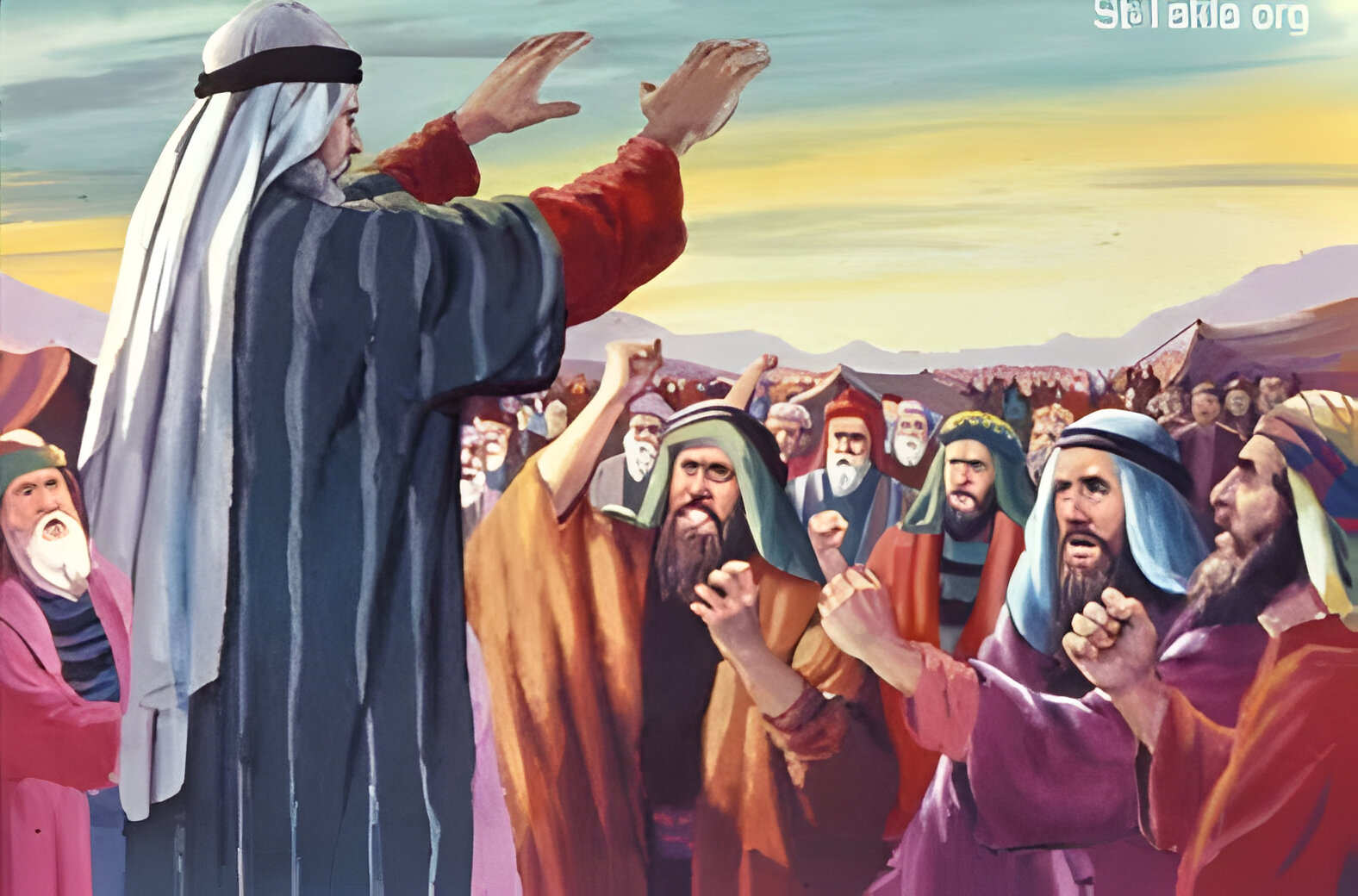 “’If only the LORD had killed us back in Egypt,’ they moaned. ‘There we sat around pots filled with meat and ate all the bread we wanted. But now you have brought us into this wilderness to starve us all to death.’” (Exodus 16:3, New Living Translation)
“’If only the LORD had killed us back in Egypt,’ they moaned. ‘There we sat around pots filled with meat and ate all the bread we wanted. But now you have brought us into this wilderness to starve us all to death.’” (Exodus 16:3, New Living Translation)
We referred to this incident before when we learned of the manna and how the people broke God’s Sabbath. This was another step in the Sabbath reform progress. Later, God would remind them of their slavery in Egypt and how Pharoah would not let them “rest” (shabath, cease from labor) as an additional reason to give their servants Sabbath rest.
“Keep the Sabbath day to sanctify it, as the LORD thy God hath commanded thee. Six days thou shalt labour, and do all thy work: But the seventh day is the Sabbath of the LORD thy God: in it thou shalt not do any work, thou, nor thy son, nor thy daughter, nor thy manservant, nor thy maidservant, nor thine ox, nor thine ass, nor any of thy cattle, nor thy stranger that is within thy gates; that thy manservant and thy maidservant may rest as well as thou. And remember that thou wast a servant in the land of Egypt, and that the LORD thy God brought thee out thence through a mighty hand and by a stretched out arm: therefore the LORD thy God commanded thee to keep the Sabbath day.” (Deuteronomy 5:12-15)
Thus, to keep the Sabbath day sanctified (set-apart for holy use) “as the LORD thy God hath commanded thee” is, not only for us to rest from our labor, but to also allow our family and workers (employees) to rest. And the reminder of how it feels not to be given this rest is how the Israelites were treated in the land of Egypt.
This “rest” (shabath) is very much connected to God’s rest upon that very first Sabbath:
“And on the seventh day God ended His work which He had made; and He rested [#7673, shabath] on the seventh day from all His work which He had made. And God blessed the seventh day, and sanctified it: because that in it He had rested [#7673, shabath] from all His work which God created and made.” (Genesis 2:2-3)
Exodus 23:12 says, by resting upon the Sabbath, we will “be refreshed” (naphash). This same word is used in Exodus 31:16-17:
“Wherefore the children of Israel shall keep the Sabbath [#7676, shabbath], to observe the Sabbath [#7676, shabbath] throughout their generations, for a perpetual covenant. It is a sign between Me and the children of Israel for ever: for in six days the LORD made heaven and earth, and on the seventh day He rested [#7673, shabath], and was refreshed [naphash].”
In Hebrews chapter 4, the author counsels us to enter into God’s rest as He did in the beginning:
“For He has somewhere spoken of the seventh day in this way: ‘And God rested on the seventh day from all his works’ … So then, there remains a Sabbath rest for the people of God, for whoever has entered God’s rest has also rested from his works as God did from His. Let us therefore strive to enter that rest, so that no one may fall by the same sort of disobedience.” (Hebrews 4:4, 9-10, English Standard Version)
What kind of “rest” did God enter into? #7673, shabath, the same “rest” that Pharaoh denied the Israelites. Of course, this “rest” isn’t merely about resting from exhaustion in a human standpoint, for God “does not become weary or tired” (Isaiah 40:28, New American Standard Version). God’s rest is a spiritual rest, and we are “to enter into that rest”— a rest that Israel as a nation never fully entered into (Hebrews 4:6).
More evidence that God’s Laws and Statutes were known during the exodus from Egypt before reaching Mt. Sinai is found in Exodus 18:16, when Moses told Jethro his father-in-law, that when the people had disputes, “I do make them know the Statutes of God, and His Laws.” These of course were the same Statutes and Laws that Abraham kept!
The Festivals and Sabbaths at Mt. Sinai
When outlining in detail His Festivals in Leviticus 23, God tells His people to observe the Day of Firstfruits the day after the first Sabbath that occurs during the seven-day Festival of Passover/Unleavened Bread (it’s actually an eight-day Festival when you include Passover). From the Day of Firstfruits, they were then to count fifty days, and on that fiftieth day they were to celebrate Shavuot (Pentecost). Although God is instituting Pentecost as a national Holy Day here in Leviticus 23, we have evidence that elements of this Festival may already have been established.
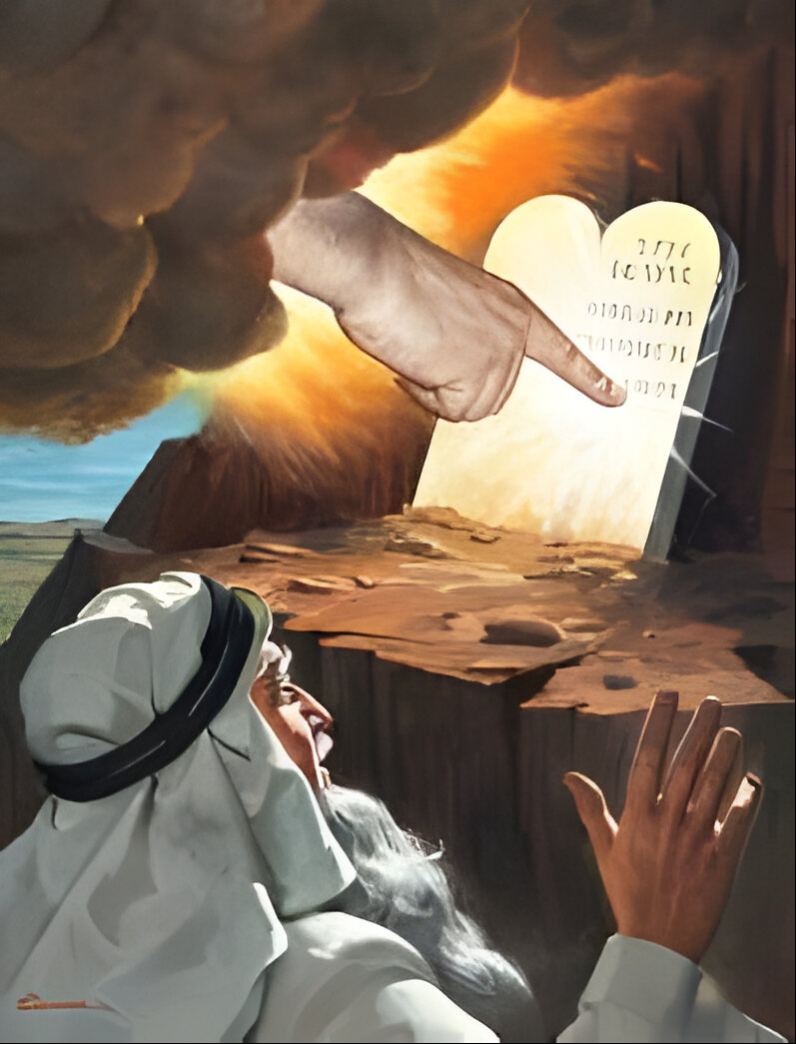 In Exodus 19:1, Moses writes that the Israelites arrived in the wilderness of Sinai “in the third month” after they had left Egypt. Since they left on the day after Passover while in Egypt, in the middle of the first month (Exodus 12:2, 6), the fiftieth day (the timing of Pentecost) would have fallen within this third month. God Himself descended upon Mt. Sinai and spoke His Law (Exodus 20:1-17). Later, while Moses ascended the Mountain to receive this Law written upon stone tablets by the finger of God (Exodus 31:18), the people below were caught up in rebellion worshipping a golden calf. They had implored Aaron to fashion a god. Upon its completion, Aaron “built an altar before it. And Aaron made a proclamation and said, ‘Tomorrow is a feast to the LORD’” (Exodus 32:5). So, although they were in rebellion, here we have a clear connection to “a feast to the LORD” and the timing of Pentecost. Then, after Moses came down with the written Law, the command went out “and there fell of the people that day about three thousand men” by the sword because of this idolatry (Exodus 32:28). For a detailed study on why God permitted this slaughter to happen, CLICK HERE.
In Exodus 19:1, Moses writes that the Israelites arrived in the wilderness of Sinai “in the third month” after they had left Egypt. Since they left on the day after Passover while in Egypt, in the middle of the first month (Exodus 12:2, 6), the fiftieth day (the timing of Pentecost) would have fallen within this third month. God Himself descended upon Mt. Sinai and spoke His Law (Exodus 20:1-17). Later, while Moses ascended the Mountain to receive this Law written upon stone tablets by the finger of God (Exodus 31:18), the people below were caught up in rebellion worshipping a golden calf. They had implored Aaron to fashion a god. Upon its completion, Aaron “built an altar before it. And Aaron made a proclamation and said, ‘Tomorrow is a feast to the LORD’” (Exodus 32:5). So, although they were in rebellion, here we have a clear connection to “a feast to the LORD” and the timing of Pentecost. Then, after Moses came down with the written Law, the command went out “and there fell of the people that day about three thousand men” by the sword because of this idolatry (Exodus 32:28). For a detailed study on why God permitted this slaughter to happen, CLICK HERE.
We see a great parallel to this in the events surrounding Jesus’ death, resurrection and ascension. Jesus died on Passover (Luke 22:1-15) and resurrected on the Day of Firstfruits (Luke 24:1). 40 days later He went up onto the Mount of Olives and ascended to His Father (Acts 1:1-3). Ten days after Jesus ascended (50 days total), the Holy Spirit came down on “the Day of Pentecost” (Acts 2:1).
When God descended upon Mt. Sinai during the time of Moses, Scripture says the Israelites witnessed thunder and fire:
“And it came to pass on the third day in the morning, that there were thunders and lightnings, and a thick cloud upon the mount, and the voice of the trumpet exceeding loud; so that all the people that was in the camp trembled … And mount Sinai was altogether on a smoke, because the LORD descended upon it in fire.” (Exodus 19:16, 18)
The Hebrew word for “thunder” here is קוֹל (qowl), which Strong’s Lexicon defines as, “Voice, sound, noise.” It goes on to say, “In ancient Hebrew culture, the concept of ‘voice’ was significant, as oral communication was the primary means of conveying information, tradition, and divine revelation.” When God renewed His covenant with Israel and gave His Law at Mt. Sinai during the time of Pentecost, He told Moses to come up into the mountain with “seventy of the elders of Israel” (Exodus 24:1). Why “seventy of the elders”? According to Yehuda Shurpin of Chabad.org, Jewish tradition teaches that the number 70 represents all the nations and languages of the world. “The concept of there being ‘70 languages’ is found in various passages of the Talmud and Midrash. For example, the Talmud tells us that when God gave the Torah [Law] on Sinai, His word was spoken in 70 languages (Talmud, Shabbat 88b), and Moses translated the Torah into 70 languages before he died (Talmud, Sotah 32a).
Thus, according to this tradition, the 70 nations of the world (represented by the 70 elders) “heard” the Law spoken in their native language. Was this not what literally happened on the Day of Pentecost in Acts chapter 2:
 “On the day of Pentecost all the believers were meeting together in one place. Suddenly, there was a sound from heaven like the roaring of a mighty windstorm, and it filled the house where they were sitting. Then, what looked like flames or tongues of fire appeared and settled on each of them. And everyone present was filled with the Holy Spirit and began speaking in other languages, as the Holy Spirit gave them this ability. At that time there were devout Jews from every nation living in Jerusalem. When they heard the loud noise, everyone came running, and they were bewildered to hear their own languages being spoken by the believers.” (Acts 2:1-6, New Living Translation)
“On the day of Pentecost all the believers were meeting together in one place. Suddenly, there was a sound from heaven like the roaring of a mighty windstorm, and it filled the house where they were sitting. Then, what looked like flames or tongues of fire appeared and settled on each of them. And everyone present was filled with the Holy Spirit and began speaking in other languages, as the Holy Spirit gave them this ability. At that time there were devout Jews from every nation living in Jerusalem. When they heard the loud noise, everyone came running, and they were bewildered to hear their own languages being spoken by the believers.” (Acts 2:1-6, New Living Translation)
And rather than 3,000 people dying by the sword like at Mt. Sinai, those gathered at Pentecost with the disciples were “cut to the heart” (Acts 2:37, New King James Version) by “the sword of the Spirit” (Ephesians 6:17). “Then they that gladly received his word were baptized: and the same day there were added unto them about three thousand souls” (Acts 2:41).
I believe these are clear parallels that cannot be denied. At first, God created mankind with His Law written in our hearts and minds. Because mankind became infected with sin, however, we lost sight of God’s Law to the point that God had to condescend to meet us where we were at and have an outline of this Law written primarily upon two stone tablets, which reflected our heart that had become stony (hard, enmity against God, Romans 8:7). The Statutes and Judgments given by God and written down by Moses in a book (known as the Torah; the Instructions) were the minute details of the principles of God’s Law that was written upon the stone tablets.
In God’s New Covenant (which is actually His Everlasting Covenant), He has promised to cut out our stony heart and replace it with a heart of flesh upon which is written His Law once again by His indwelling Spirit (Jeremiah 31:33; Hebrews 8:10)— “That the righteousness of the Law [i.e., God’s attributes] might be fulfilled in us, who walk not after the flesh, but after the Spirit” (Romans 8:4). Thus, God’s Law will be “written not with ink, but with the Spirit of the living God, not in tablets of stone, but in the fleshly tablets of the heart” (2 Corinthians 3:3). And this again will include His Statutes and Judgments:
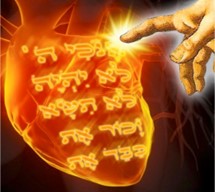
“A new heart also will I give you, and a new spirit will I put within you: and I will take away the stony heart out of your flesh, and I will give you an heart of flesh. And I will put My spirit within you, and cause you to walk in My Statutes, and ye shall keep My Judgments, and do them.” (Ezekiel 36:26-27)
But Wasn’t the Law “added” at Mt. Sinai?
One question that seems to always arise when dealing with this topic is based on what Paul wrote in Galatians chapter 3:
“Now to Abraham and his Seed were the promises made. He does not say, ‘And to seeds,’ as of many, but as of one, ‘And to your Seed,’ who is Christ. And this I say, that the Law, which was four hundred and thirty years later, cannot annul the covenant that was confirmed before by God in Christ, that it should make the promise of no effect. For if the inheritance is of the Law, it is no longer of promise; but God gave it to Abraham by promise. What purpose then does the Law serve? It was added because of transgressions, till the Seed should come to whom the promise was made; and it was appointed through angels by the hand of a mediator.” (Galatians 3:16-19)
The belief that God’s Law was only given to Israel at Mt. Sinai stems from a misunderstanding of what Paul means when he says the Law was “added” “four hundred and thirty years” after the promises God made to Abraham. If this were so, then God’s Commandments, Statutes and Judgments (including the Festivals and Sabbaths) were not given until Mt. Sinai. Coupled with that understanding, these Laws were only given “till the Seed” [‘who is Christ’] should come” and therefore, at His death, all of these Laws, Statutes and Judgments, Festivals, and Sabbaths were abolished at the cross.
This is exactly what Mr. Goeman’s (whom I quoted earlier) believes on this subject. In the same article, he writes: “Paul clearly argues that since believers are not under the Mosaic covenant, those former laws (including the laws of the Decalogue) have no binding authority over the believer.” For those of you who do not know, the Decalogue refers to the Ten Commandments. How sad to believe and teach this. Are we really to believe that “New Testament believers” will kill, steal, commit adultery and worship other gods etc. without any negative consequences? When it comes to God’s Law, Paul never argued that it was abolished (Romans 3:31; 7:12); he only argued against the belief that the Law is the means to salvation.
Furthermore, I believe we have made a sufficient case that God’s Laws, including the Decalogue, Statutes, and His Judgments were certainly known, taught, and observed before they were written down at Mt. Sinai. They may not have been observed exactly the way God instructed Moses and the Israelites after Mt. Sinai, but the primitive understanding of these Laws and Appointed Times were experienced by believers from the beginning.
So, what does Paul truly mean about the Law being “added” and in operation “till the Seed should come”? For a detailed analysis of this, CLICK HERE.
